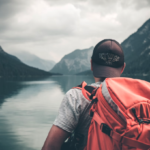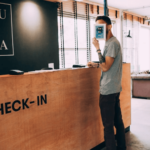The COVID-19 pandemic is disrupting the hospitality industry more than previous recessions and 9/11. With lockdowns in place all over the world, revenues plummeted due to low occupancy and massive booking cancellations. Hospitality marketing during COVID-19 is tricky at best.
Plus, hundreds-of-thousands of hospitality employees are furloughed or laid-off. Some financial experts say if the pandemic continues to worsen, many hotels will close or bankrupt. In the US alone, it’s estimated at least 10-15% out of 56,000 hotels are at risk of declaring bankruptcy. Consequently, several hotels asked the federal government for aid packages to continuously finance their business operations and skeletal forces.
What can hotels do in response to COVID-19? While no amount of marketing can stop the crisis, there are several strategies to employ that can help keep business afloat during this time. Focus on reputation management. Develop a prevention and recovery plan. Apply other effective marketing techniques.
Reputation Management
In this time of crisis, it’s crucial to maintain a good reputation. Ensure the safety and security of your guests by implementing more stringent health and sanitary protective measures. Moreover, hotel staff should be informed and trained to execute these stricter policies to circumvent negative feedback from guests.
Here are other reputation management strategies to consider:
● Get Ready
Nobody knows when a crisis will strike. But, you can minimize its negative effects by having concrete house policies on particular events such as a pandemic. In case of contamination, set measures to mitigate the spread of the virus, like having a communication team ready. Specifically, designate their roles, protocol to follow, channels of communication, emergency contacts and social media log-in details.
● Act Fast
Stay on top of the situation by acting fast on problems that may arise in your hotel. That way you can quickly contain the crisis. It will also help to conduct further investigation, explore your options, and determine the possible consequences. Communicate your assessments, and coordinate with government authorities and local health officials for updates and instructions.
● Publish a Response
Have a person in charge of responding to people’s queries or the media. Additionally, issue official statements if an incident occurs and answer FAQs on your website and social media channels. Usually, the questions involved here are: What happened? When and where it happened? Who was affected? And what will be done? Be transparent with your answers and don’t hide or distort the truth from guests.
● Avoid Misinformation
Trust only reliable sources in getting information and updates. Get it straight from authorized government agencies and official travel advisories such as the Department of Health and the World Health Organization (WHO). They are the proper agencies to get the latest updates and information when it comes to COVID-19 and other health issues. Filter out unverified news so you won’t be misinformed and provide misleading information to your guests and employees.
● Reach Out to Industry Partners
Remember you are not alone in this pandemic. Other hotels are going through it as well. If you have information that could help, share it with industry peers so you can work as one to reduce the effects of the virus. Remember, a rising ride raises all boats.
● Restore Your Reputation
If you received negative feedback at the height of the COVID-19, observe these measures to rebuild your reputation:
- Communicate with the source and clarify the issue. Then see what you can do to help and ask them to edit or delete the negative content.
- Flag or report deceptive information on review sites and social media channels.
- Answer reviews and commentary.
- Generate positive content by starting review outreach and PR campaigns.
Guerrilla Marketing
Guerrilla marketing is simply an advertising technique that uses offline (but sometimes online) tactics to get people’s attention. This marketing strategy intends to advertise in a stealthy manner. Think of guerrilla fighters: they attack the enemy by surprise. Before the person knows it, they’re surrounded and captured.
Guerilla marketing heavily relies on your creativity to attract customers by producing a unique style. Like other advertising techniques, it generates a huge impact too. This can be especially useful now that people are under quarantine. As they have more time to notice you, allowing you to earn more market share and attract future clients. But you should first familiarize yourself with the types of guerrilla marketing:
● Street Marketing
Street marketing is an effective way of calling people’s attention when you are within a specific location. Product demonstrations and installations like air dancers are some of the most effective street marketing ideas. This type of guerilla marketing is often cheaper than other alternatives.
● Grassroots Marketing
This is another form of guerrilla marketing where you can build brand awareness from the ground up. It is accomplished by establishing a relationship between your brand and your customers before funding a mass promotion. Also, you win your customers’ hearts by giving them a free sample of your service to let them experience it.
● Stealth Marketing
Stealth marketing strategy attempts to promote a service to a person without them knowing. In other words, while you get your clients’ attention, your services are implicitly promoted. For instance, during this pandemic, you can apply this technique by having your brand appear in films or TV shows as more people are at home—watching.
Social Media Marketing
Social media marketing is the fastest way to connect with your clients and update them about measures on how to lessen the impact of COVID-19. You should also use social media to disseminate information to your guests. Cover how you are addressing the crisis. You can share your precautionary measures online to let the public know the health, safety, and security of your guests are the utmost priority.
At present, various hotels introduced immediate steps to help stop the spread of the virus. These include giving guests a travel-size hand sanitizer upon check-in, serving plated meals instead of buffet meals to prevent interaction, and regularly sanitizing facilities and amenities used within the property.
Develop a Prevention Plan
In response to the pandemic, various hotels – in coordination with local and state health authorities – developed a Prevention Plan to show their preparations. Here are some approaches you may want to implement:
- Disinfect hotel amenities, including keycards and pens used by the guests
- Require guests to observe social distancing in public spaces like elevators, lobby, and front desk
- Regularly sanitize and clean the entire property
- Keep records of your guests and staff movements. It helps trace possible interactions in case an infected guest checked-in.
- Check with health authorities for possible actions to take if one of you suspect a guest has COVID-19 symptoms.
- Train housekeepers on how to use disinfectant properly. For example, how to apply the right to effectively kill the virus. This is especially important for contact surfaces like public areas, guestrooms, television remote controls, toilet flush handles, door handles, water faucet handles, and floors.
- Post signages in common areas advising guests and workers to wash their hands regularly when in contact with hotels facilities and other contact surfaces.
- Orient your staff of the common signs and symptoms of coronavirus infection, like fever, sore throat, dry cough and shortness of breath.
- Disallow guests with respiratory symptoms to access and use any of the hotel facilities like a gym or fitness center.
Final Thoughts
Hotels all over the world are suffering due to COVID-19. This has resulted in closures and job losses as lockdowns and quarantines occur everywhere. Keep your business afloat by adopting the right marketing strategy to entice clients to book when things settle down. To keep your brand on top of your clients’ minds, strive to guarantee safety and security with concrete measures to prevent or contain the spread of coronavirus in your property.





